Keywords: Religion
There are more than 200 results, only the first 200 are displayed here.
-

- Shannon and Kateena
- 12 June 2015
1 Comment
'In chapter 12 "Respecting Autonomy and Protecting the Vulnerability of the Dying", Frank quoted my grandmother ... "Well there is not much to say about euthanasia is there? Just don't kill people and look after them while they are dying. What more can you say?" Well Grandma, I am not certain that I share your view. Just as Pope Francis did not know all the answers at age 36 years, neither do I.' Frank Brennan's nieces Shannon and Kateena help launch his new book Amplifying That Still, Small Voice.
READ MORE
-

- Michael Elligate
- 10 June 2015
'The Institutional Church has so often taken smug refuge in pushing the need for an informed conscience. However this does not certainly mean personal freedom must bow to the stand of the establishment. The rights of partners to be honest in their own sexual matters is given due place in this new book.' Fr Michael Elligate launches Fr Frank Brennan SJ's book Amplifying That Still, Small Voice at Newman College, Melbourne, 5 June 2015.
READ MORE
-

- Paul Bongiorno
- 09 June 2015
9 Comments
'In discussing Australia's asylum seeker policies Frank laments the government's deaf ear to calls from the churches, his own included, for a greater measure of compassion and a better way of dealing with the issue of boat people. Frank wryly comments: 'If only the Abbott Government with its disproportionate number of Jesuit alumni cabinet ministers could listen.' Paul Bongiorno launches Fr Frank Brennan SJ's book Amplifying That Still, Small Voice at the Australian Centre for Christianity and Culture, Canberra, 8 June 2015.
READ MORE
-

'We were told to 'believe' that God could perform miracles, but this was a false lead in terms of what we now know about sacred discourse in the holy lands. This literalism was used against other religions to prove the supremacy of Christianity, but ironically it is what turned the majority of Europeans and Australians off religion as education has swept through Western nations in recent times.' David Tacey reflects on faith and belief. Andrew Hamilton replies.
READ MORE
-

- Kristina Keneally
- 04 June 2015
12 Comments
'As a legislator and a Catholic, I often felt gratitude for Frank Brennan's ambassadorship from the republic of conscience. I found the need to weave, this need to take 'data points' from many places and form my conscience. I regarded Frank as a bit of a hero.' Kristina Keneally launches Fr Frank Brennan SJ's book Amplifying That Still, Small Voice at Our Lady of the Way Parish, North Sydney, 2 June 2015.
READ MORE
-
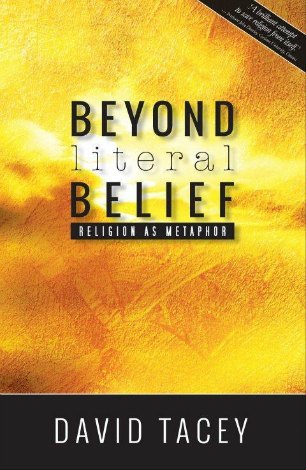
AUSTRALIA
- Andrew Hamilton
- 14 May 2015
50 Comments
Australian writer David Tacey argues that the Christian story, like all religious beliefs, should be seen as metaphor. He argues that in turning from a literal understanding, we recapture the original Christian message. But for me, adopting his reading would mean the loss of a personal God to whom I can pray, of a Christ who is a living presence among his followers, and of a community in living continuity with Jesus' disciples.
READ MORE 
-

EUREKA STREET TV
- Peter Kirkwood
- 13 May 2015
3 Comments
Most recent controversies over places of worship in Australia have involved Muslim prayer halls, cultural centres and mosques. But at Crossley, a small coastal community between Port Fairy and Warrnambool, there was another dispute over a place of worship, but a Catholic one. One of the social activists spearheading the campaign was author Regina Lane.
READ MORE 
-
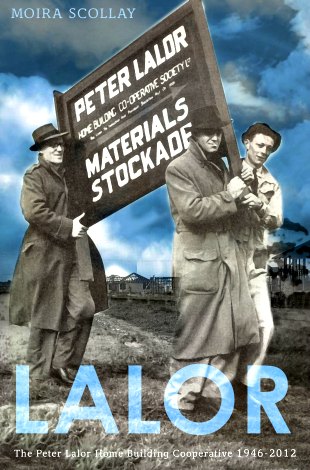
AUSTRALIA
- Andrew Hamilton
- 23 April 2015
15 Comments
Anzac Day is special but limited in its depiction of Australian virtues. A deeper manifestation lies in the housing cooperative members of former Pay Corps members who used their military schooling in planning and organisation to launch a housing cooperative north of Melbourne. It was open to everyone, regardless of religion or race, and reflected the veterans' determination to make Australia a better place free from the class divide and unfairness of the Depression.
READ MORE 
-
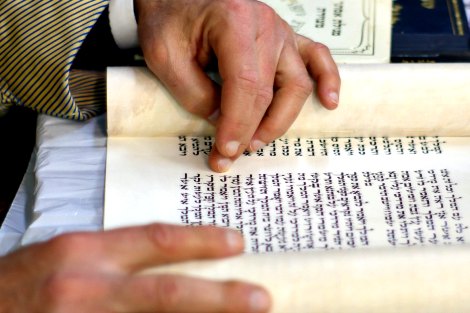
ARTS AND CULTURE
- Earl Livings
- 07 April 2015
3 Comments
The addled cultures of exclusivity clash, and clash again, as have all zealots, all purgers of scapegoats, all crusading armies, to the same breathless end. We can only stand before each, Torah, Gospel, Qu’ran, as if before an opening star, and know them as incarnations of that lush silence that inspires believer and non-believer to Truth, Beauty, Good.
READ MORE 
-
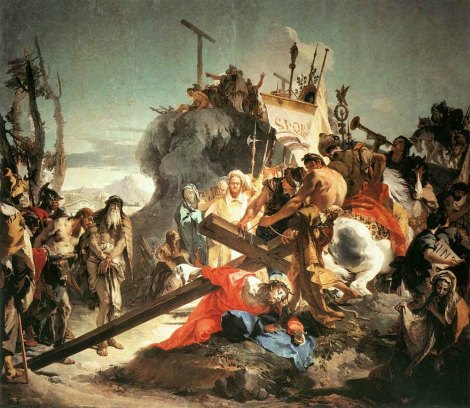
AUSTRALIA
- Andrew Hamilton
- 02 April 2015
8 Comments
Jokes are also part of the story of Jesus’ killing. They are not harmless, but are bitter mockery. After Jesus is sentenced he is mocked by the bored soldiers guarding him. As he hangs writhing on the cross, the bystanders and the local authorities also mock him because he claimed to be the Son of God.
READ MORE 
-
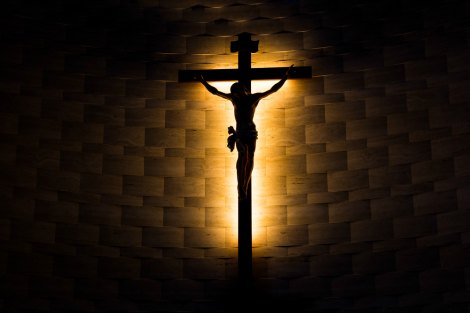
ARTS AND CULTURE
- Marlene Marburg
- 31 March 2015
5 Comments
i am small and lowly at the feet of my Christ. my hair is sharp like needles on his skin. my tears wash the dirt stuck to his wounds.
READ MORE 
-
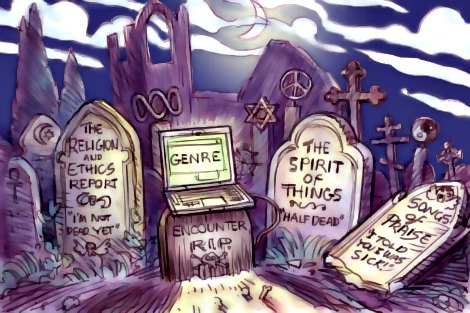
AUSTRALIA
- Michael Mullins
- 01 December 2014
29 Comments
ABC presenter Quentin Dempster has referred to a 'nincompoop' in senior ABC management who was heard to comment on the need to get rid of the 'strangle-hold of specialisation'. Radio National is the home of specialisation at the ABC, and religion has been one of its signature specialisations, because of the public broadcaster's 'cultural diversity' charter obligation. Management is executing the emasculation of the ABC that Rupert Murdoch expects from the Abbott Government as a reward for his role in its 2013 election victory.
READ MORE 